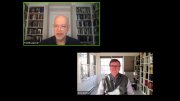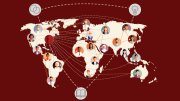In a discussion of the Russia-Ukraine War hosted by the Ash Center for Democratic Governance and Innovation, Arne Westad, Elihu professor of history at Yale University, began with an overarching statement: “There is absolutely no doubt that this is, first and foremost, a war of conquest that we haven’t seen in Europe since 1944,” he said—different from the Soviet interventions in Hungary, Czechoslovakia, and the Balkans. “This is an attempt not just to take over a foreign state, but to wipe out the Ukrainian sense of nationhood.”
Westad’s statement set the tone of his conversation with Fredrik Logevall, Belfer professor of international affairs at Harvard Kennedy School. In the Tuesday talk, co-hosted by the Belfer Center for Science and International Affairs, the two scholars provided historical and contemporary context for the Russian invasion of Ukraine, analyzed its impact on foreign policy, and speculated on how the fighting could end.
Putin’s resentment of the West stretches well beyond a Cold War context, Westad explained, back to Bolshevism and Marxism in Russia. Putin spent “about half of [a recent] speech blaming Lenin for what had gone wrong in terms of Russian history,” he said. “So for those in this country, perhaps, that think that this has something to do with Communism…that’s not a good starting point.” Westad believes Putin’s motivations show how tough the war will be to end. “He started the war because he believes it’s widely important for the future he sees for Russia, to destroy Ukraine,” he said, “to make Ukraine, in terms of territory and people, part of Russia.” Whatever they achieve on the battlefield, Westad explained, they’re not going to achieve that goal.
So how can the conflict stop? While Logevall and Westad praised the leadership of Zelensky and the efforts of the Ukrainian military, they believe it’s highly likely that the much larger Russian force will defeat the Ukrainian army. But even if Russia reaches most of its strategic objectives and Putin declares victory, both believe a long-term rule over Ukraine will be unsustainable due to the massive loss of life and economic catastrophe a continuing conflict would cause. “It’s very hard for an occupied nation to see the occupying army as its friend,” Logevall pointed out. And while Putin has been able to offer some stability to Russians who experienced the chaos and decline of the 1990s, Westad said, this conflict and the continuing collapse of the ruble could undermine a continued occupation.
China, whom Russia relies on heavily for trade, could also play a role in ending the war, if it chooses. “This is the first global crisis that I can think of where China might possibly have a greater impact than the United States,” Westad said. And with increasing sanctions from the West, the reliance has only increased. “Let me very blunt about this: the moment the Chinese decide that they’ve had enough of this murderous conflict, the conflict will in some way stop.” China could have little interest in intervening, though; if the war leaves Russia even more “in the pocket” of China, “China will be able to further exploit Russia,” Westad said.
Logevall and Westad, natives of Sweden and Norway respectively, also remarked on the solidarity that Putin’s actions have triggered—likely to his surprise. “I would never have expected, maybe in my lifetime, to see a majority of Swedes, or a solid plurality of Swedes wanting to join NATO,” Logevall said. “We’re now seeing that. And in Finland, the percentages are higher. The conflict also pushed Germany to push its biggest increase in military spending in its post-war era—something years of U.S. encouragement could not do alone. “On some level, at least, it underscores the degree to which Putin has miscalculated here,” Logevall said, “the degree to which this alliance…has been strengthened in the short term, maybe medium term, maybe long term by this.”
Is it useful for the current situation to be labeled as a second Cold War? No, Westad said: the structure of the international system is different enough that a direct comparison is not so useful. But this stance doesn’t suggest optimism. “In some ways it is more frightening because the Cold War did offer some stability,” he said. “This is perhaps less stable.” Though he believes the United States and China are the most powerful international players, the countries aren’t predominant in their influences the way the United States and the Soviet Union once were. He believes the environment more closely resembles the approach to World War I than the Cold War. “Saying that ‘Our country, our people, are in need of territory, in need of buffer zones.…’ All of those kinds of statements would be easily recognizable to people who lived in that late 19th-century world,” Westad said. No Cold War, but perhaps something more chilling.









